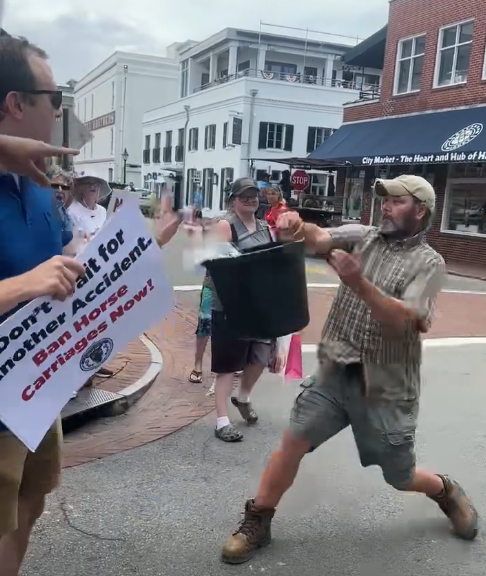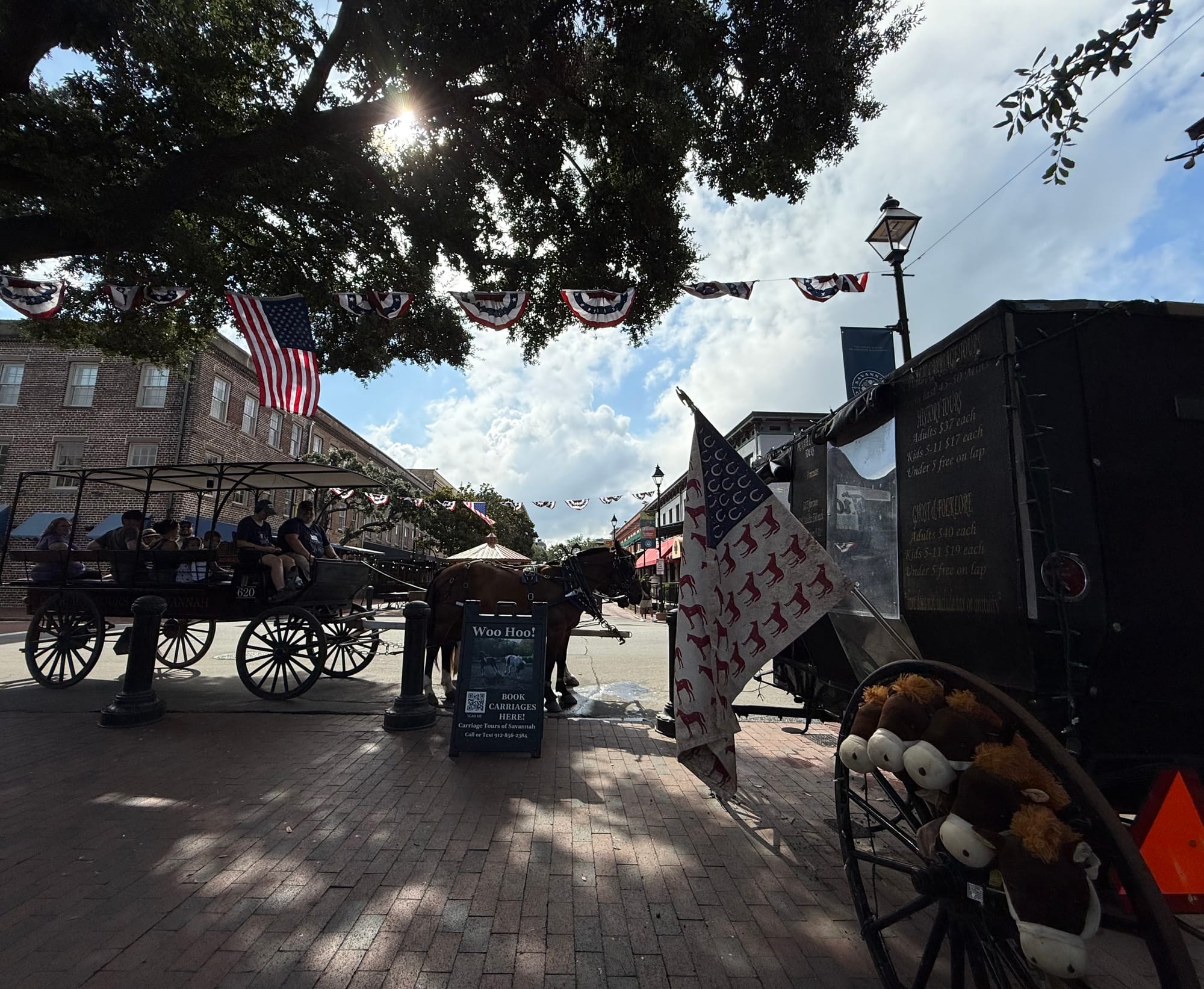FOR decades, horse-drawn carriages have been a major tourist attraction in Savannah, a nearly synonymous image embodying our history and allure.
For almost that much time, there have been those who’d like to see the practice banned altogether.
“This is one of the iconic features of the city. It’s one of the things that people want to check off their list when they come here,” says Cara Marshall, owner and operator of Carriage Tours of Savannah, one of the two local carriage companies.
Tensions often grow high in this debate, and this past Fourth of July weekend was no exception.
Much of local social media was dominated by a video of a man in City Market throwing a bucket of water used for sponging down horses on Savannah Alderman Nick Palumbo. Palumbo and a group of activists were there on July 5 protesting the horses being used for drawing carriages during the high heat of the weekend, calling to "Ban Horse Carriages Now."
The protests were not out of the blue – they came ahead of highly controversial proposed City ordinance changes, to be discussed at City Council’s regular meeting on July 10.

Current City ordinance allows the horse carriages to operate until the outside temperature hits 95 degrees Fahrenheit, or a heat index of 110 degrees, after which they are required to cease operations for the day to protect the health of the horses.
That threshold is the same as the one used in Charleston, where horse-drawn carriages are similarly popular with visitors.
There are several ordinance change options to be discussed by Council on Thursday. One would decrease that temperature threshold to 85 degrees, and another would decrease it to 92 degrees. See those options here.
Another option – supported by City Manager Jay Melder – would adopt a so-called “wet bulb” standard of 91 degrees for the carriages to cease operations, incorporating several additional variables in addition to thermometer readings.
Some say that given the typical temperature range in Savannah, the new and lower 85-degree option supported by Alderman Palumbo would be an effective ban on the industry, and would put the two carriage companies in Savannah – the similarly-named Carriage Tours of Savannah and Savannah Carriage Tours – out of business.
“That would be ten degrees cooler than our current standard, and the standard in most other cities. Most of our year is spent above the 85-degree level,” says Marshall. “If that option passes, we might only be able to work in November, December, and January, when there’s much less tourism.”

This isn’t Marshall's first rodeo, so to speak. She's a 25-year-plus veteran of the carriage trade, and the company itself has been around for half a century.
Marshall says animal rights activism is “a cost of doing business in this industry,” adding that “We are in complete compliance. It would be different if we were a bunch of cowboys disregarding the rules. But we are law-abiding, and in total compliance with City regulation. Why are we even having this conversation?”
While admitting that the City Market incident was "very unfortunate," Marshall clarifies that the man who threw water on Palumbo “doesn’t work for us and has never worked for us,” and was employed by the other company in town. (He has since been fired.)
“When I saw that, I had no idea who he was. Because of what we see on a regular basis, with people imbibing downtown especially around City Market, honestly it didn’t surprise me. We see a lot of weird stuff,” she explains.
“I figured it was just some crazy guy who’d maybe had too much to drink and who grabbed the bucket. Especially since it was a hot holiday weekend when so many people are downtown drinking,” she says.
Marshall says she thinks that most Savannah residents can see that “these are two different issues,” and that the attack by the man has nothing to do with what standards should or shouldn't be applied to horse-drawn carriages.
Should the two local carriage companies have to cease operations due to new rules, it would result in roughly 40 local people being out of work – approximately 20 employees at each of the two companies.
“And of course there’s a ripple effect," Marshall adds. "Anyone we buy feed from locally would be impacted. My farrier, who shoes our horses, would no longer have that work.”
While many commenters on social media often say that the horses of these two companies would “go to the glue factory” if the industry is shut down locally – in other words, be euthanized – Marshall says that isn’t necessarily the case.
If the worst-case scenario happens for local carriage companies and the ban-that-isn’t-a-ban passes Council, she says her horses “would be sold. I have a lot of great friends, including the people who helped me acquire our horses to begin with, and I would turn to them for help in finding another home for them. It would effectively be what's called a ‘herd dispersal’ – that’s the term for what we would have to do.”
Marshall says that while others might decide to auction off their horses, “that’s not what I would do. It would be a process just like rehoming a family pet – heartbreaking and unnecessary.”

